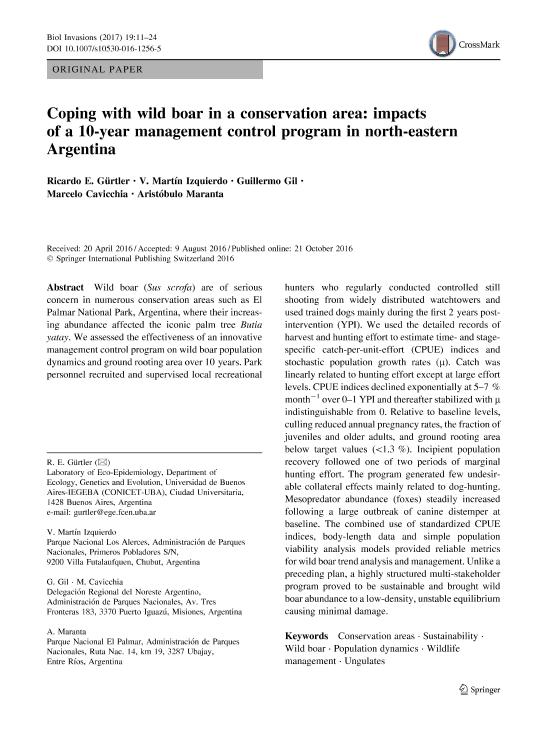Artículo
Coping with wild boar in a conservation area: impacts of a 10-year management control program in north-eastern Argentina
Gurtler, Ricardo Esteban ; Martín Izquierdo, V.; Gil, Guillermo Pablo; Cavicchia, Marcelo; Maranta, Aristóbulo
; Martín Izquierdo, V.; Gil, Guillermo Pablo; Cavicchia, Marcelo; Maranta, Aristóbulo
 ; Martín Izquierdo, V.; Gil, Guillermo Pablo; Cavicchia, Marcelo; Maranta, Aristóbulo
; Martín Izquierdo, V.; Gil, Guillermo Pablo; Cavicchia, Marcelo; Maranta, Aristóbulo
Fecha de publicación:
01/2017
Editorial:
Springer
Revista:
Biological Invasions
ISSN:
1387-3547
Idioma:
Inglés
Tipo de recurso:
Artículo publicado
Clasificación temática:
Resumen
Wild boar (Sus scrofa) are of serious concern in numerous conservation areas such as El Palmar National Park, Argentina, where their increasing abundance affected the iconic palm tree Butia yatay. We assessed the effectiveness of an innovative management control program on wild boar population dynamics and ground rooting area over 10 years. Park personnel recruited and supervised local recreational hunters who regularly conducted controlled still shooting from widely distributed watchtowers and used trained dogs mainly during the first 2 years post-intervention (YPI). We used the detailed records of harvest and hunting effort to estimate time- and stage-specific catch-per-unit-effort (CPUE) indices and stochastic population growth rates (μ). Catch was linearly related to hunting effort except at large effort levels. CPUE indices declined exponentially at 5–7 % month−1 over 0–1 YPI and thereafter stabilized with μ indistinguishable from 0. Relative to baseline levels, culling reduced annual pregnancy rates, the fraction of juveniles and older adults, and ground rooting area below target values (<1.3 %). Incipient population recovery followed one of two periods of marginal hunting effort. The program generated few undesirable collateral effects mainly related to dog-hunting. Mesopredator abundance (foxes) steadily increased following a large outbreak of canine distemper at baseline. The combined use of standardized CPUE indices, body-length data and simple population viability analysis models provided reliable metrics for wild boar trend analysis and management. Unlike a preceding plan, a highly structured multi-stakeholder program proved to be sustainable and brought wild boar abundance to a low-density, unstable equilibrium causing minimal damage.
Archivos asociados
Licencia
Identificadores
Colecciones
Articulos(IEGEBA)
Articulos de INSTITUTO DE ECOLOGIA, GENETICA Y EVOLUCION DE BS. AS
Articulos de INSTITUTO DE ECOLOGIA, GENETICA Y EVOLUCION DE BS. AS
Citación
Gurtler, Ricardo Esteban; Martín Izquierdo, V.; Gil, Guillermo Pablo; Cavicchia, Marcelo; Maranta, Aristóbulo; Coping with wild boar in a conservation area: impacts of a 10-year management control program in north-eastern Argentina; Springer; Biological Invasions; 19; 1; 1-2017; 11-24
Compartir
Altmétricas



